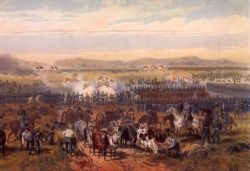The Life & Times of Ulysses S. Grant
Gallant Service
Newly-christened Lieutenant Grant served in the Mexican-American War under Generals Taylor and Scott. Under General Scott, Grant was assigned as a quartermaster, which left him a little disappointed with the lack of action. He was stationed close enough to the front to see action, however, and fought bravely. He fought in the battles of Resaca de la Palma, Monterrey, Palo Alto (pictured below) and Veracruz. In Monterrey, Grant risked his life through a sniper-riddled street to carry a message on horseback; in another battle, he saved his friend and future brother-in-law Fred Dent, after Dent had been shot in the leg. Grant rushed to pull him off of the battlefield, and was almost killed by a Mexican soldier. Another comrade saved him just in time.
Grant's bravery earned him "brevets," which are, in essence, temporary or "fake" promotions. The soldier in question, when brevetted, is authorized to hold the new, higher rank---but in name only. They only receive the higher pay grade when actually serving in the higher rank. It is an honorary system that seems confusing and odd by today's standards, which is most likely why it was abandoned in favor of using medals to commend bravery. Grant's permenant rank was first lieutenant, but he received brevets for both first lieutenant and captain at Molino del Rey and Chapultepec.
During the Mexican-American War and his service in it, Grant started to formulate his own beliefs and judgments about warfare. He judged the actions of high officers (though not out loud at the time, obviously) and decided that this war was immoral. He disagreed with actions taken by superiors, and believed the entire premise of the war to be a front for acquiring more land that was unopposed to slavery. In his best-selling memoirs written at the end of his life, Grant reflected on his experience in the war, saying, "I was bitterly opposed to the measure, and to this day, regard the war, which resulted, as one of the most unjust ever waged by a stronger against a weaker nation." He also stated, "I do not think there was ever a more wicked war...I thought so at the time...only I had not moral courage enough to resign."
It may seem odd to us that a great general like Grant would be opposed to wars as "immoral" or "unjust." To him, however, he saw nothing in the Mexican-American war except a big bully provoking a puny child to respond, and beating him to a pulp (and taking his lunch money) when he did inevitably retaliate. His experience in this war helped him formulate his ideas, ethics, and beliefs that would characterize his command of the U.S. Civil War.
During the Mexican-American War and his service in it, Grant started to formulate his own beliefs and judgments about warfare. He judged the actions of high officers (though not out loud at the time, obviously) and decided that this war was immoral. He disagreed with actions taken by superiors, and believed the entire premise of the war to be a front for acquiring more land that was unopposed to slavery. In his best-selling memoirs written at the end of his life, Grant reflected on his experience in the war, saying, "I was bitterly opposed to the measure, and to this day, regard the war, which resulted, as one of the most unjust ever waged by a stronger against a weaker nation." He also stated, "I do not think there was ever a more wicked war...I thought so at the time...only I had not moral courage enough to resign."
It may seem odd to us that a great general like Grant would be opposed to wars as "immoral" or "unjust." To him, however, he saw nothing in the Mexican-American war except a big bully provoking a puny child to respond, and beating him to a pulp (and taking his lunch money) when he did inevitably retaliate. His experience in this war helped him formulate his ideas, ethics, and beliefs that would characterize his command of the U.S. Civil War.

